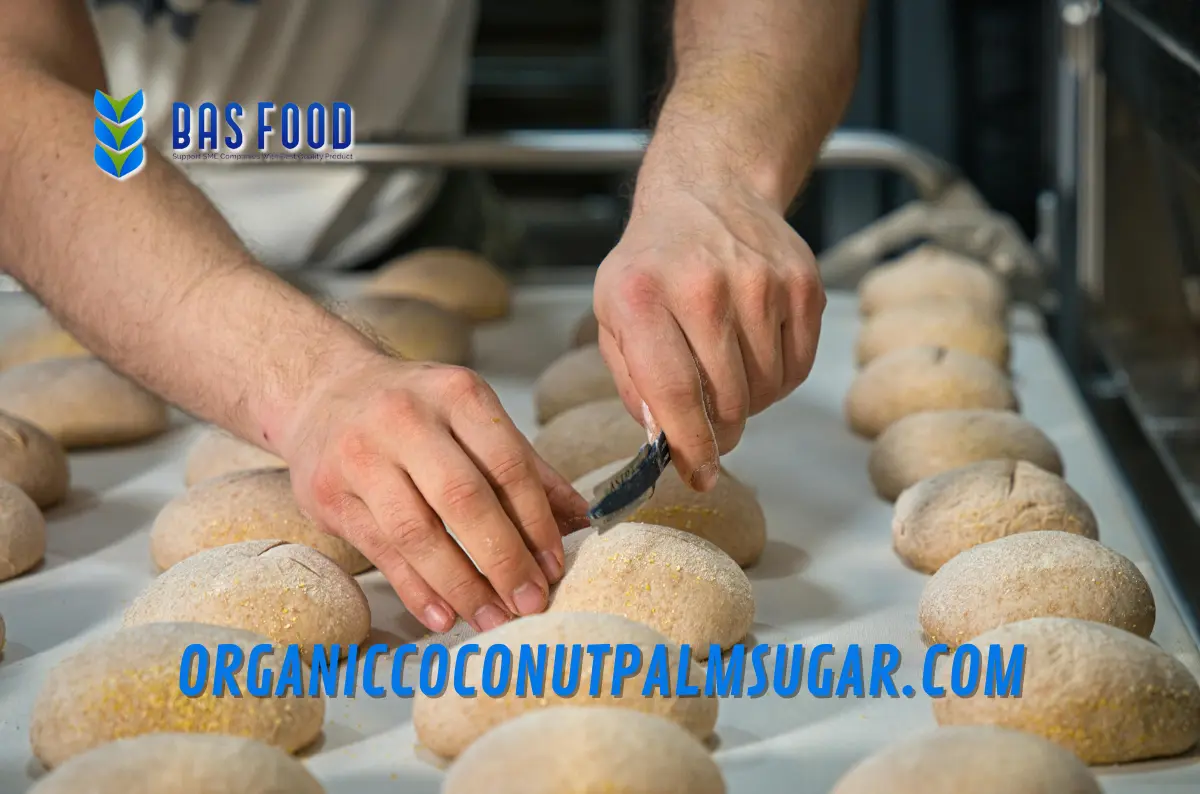Over the past decade, coconut-based products have reshaped the food industry. Among them, bulk coconut flour has become a game changer for bakeries, cafés, and health brands worldwide. It’s gluten-free, high in fiber, and naturally aromatic—making it a perfect fit for today’s growing demand for nutritious, plant-based ingredients.
Coconut flour isn’t just a passing trend. It’s an essential ingredient for innovative bakers who want to offer healthier products without compromising flavor. From muffins and cookies to pancakes and protein bars, this tropical flour is quietly taking over the shelves and menus of wellness-conscious businesses.

What Exactly Is Coconut Flour? A Closer Look at Its Origins
Coconut flour is made by drying and finely grinding the white meat of mature coconuts after the oil has been extracted. The result is a light, fluffy flour that’s naturally gluten-free and rich in dietary fiber. Unlike wheat flour, it absorbs a lot of liquid, which makes recipes denser but also more filling.
In tropical countries like Indonesia and the Philippines, coconut flour production is an efficient way to utilize every part of the coconut. It’s made from what’s left after producing coconut milk or oil, which means it’s a sustainable byproduct. This circular use of resources is one of the reasons many global buyers prefer wholesale coconut flour from Southeast Asia—it aligns with sustainable and zero-waste principles.
Why Bakeries and Cafés Are Switching to Bulk Coconut Flour
Bakeries and cafés around the world are rethinking their ingredients. Healthier flours like coconut flour are not only appealing to gluten-free customers but also to those seeking more nutritious, high-fiber options. When purchased as bulk coconut flour, it provides cost efficiency for businesses that bake daily.
Coconut flour adds a mild, natural sweetness and a pleasant aroma to baked goods. It pairs beautifully with chocolate, fruit, or even savory recipes. Whether it’s coconut brownies, keto muffins, or gluten-free pancakes, using coconut flour allows cafés and bakeries to tap into the wellness market while maintaining taste and texture.
For cafés that prioritize quality and consistency, bulk packaging coconut flour ensures there’s always enough supply for large-scale baking. It also reduces waste and packaging costs—a big win for environmentally conscious brands.
The Health Appeal: Coconut Flour as a Nutrient Powerhouse
One of the strongest reasons health brands love coconut flour is its nutrient profile. It’s packed with fiber—almost four times more than regular wheat flour—and contains healthy fats that support metabolism and energy levels. It’s also a good source of protein, iron, and lauric acid, a natural compound known for its antibacterial properties.
Coconut flour’s low glycemic index makes it a preferred ingredient for diabetics or anyone managing their sugar intake. Health brands use it to create gluten-free protein bars, pancake mixes, and low-carb snacks. The demand for coconut flour B2B supply has grown rapidly as more consumers read labels and choose ingredients that are clean, simple, and beneficial.
For businesses, marketing a product that contains coconut flour immediately adds value. It signals “healthy,” “natural,” and “premium”—all words that today’s consumers want to see on their food packaging.
Why Buying Wholesale Coconut Flour Makes Business Sense
Purchasing wholesale coconut flour offers significant benefits to businesses. First, it drastically lowers the cost per kilogram compared to retail packaging. For bakeries or food manufacturers that require a steady supply, buying in bulk ensures both consistency and cost savings.
Second, bulk buying strengthens the relationship with suppliers. Businesses can negotiate custom specifications, such as moisture content or particle size, ensuring the flour fits their product requirements. Reliable suppliers often provide bulk packaging coconut flour options, ranging from 10 kg to 25 kg bags, which makes shipping and storage much easier for B2B buyers.
For importers and large-scale food producers, working directly with a trusted supplier also means access to quality assurance documents like COA (Certificate of Analysis), export permits, and food safety certifications. This professional supply chain is critical when entering strict markets such as the EU or the USA.
The Role of CV Bonafide Anugerah Sentosa in Supplying Bulk Coconut Flour
Indonesia is one of the world’s top coconut producers, and companies like CV Bonafide Anugerah Sentosa play a key role in bringing high-quality coconut products to global buyers. Based in Kulon Progo, Yogyakarta, this company is a trusted coconut supplier and spices exporter, serving clients across Asia, Europe, and the Americas.
CV Bonafide Anugerah Sentosa provides bulk coconut flour, coconut milk, coconut water concentrate, desiccated coconut, and other derivatives—all produced under strict quality control. The company focuses on sustainability and fair sourcing, ensuring that every coconut product supports both local farmers and international standards.
Beyond coconut, the company is also known as a spices supplier, offering Indonesian commodities like nutmeg, cloves, and vanilla beans. This broad product portfolio makes it a reliable partner for importers who prefer sourcing multiple commodities from one exporter.
How to Choose the Right Bulk Coconut Flour Supplier
Finding the right supplier for coconut flour B2B supply can determine your business success. Here are key factors to consider:
- Product Quality:
Always check if the supplier offers food-grade coconut flour with low moisture content (below 5%). A fine texture and light color are indicators of high-quality flour. - Certifications:
Look for suppliers with HACCP, ISO, or organic certifications, especially if you export to countries with strict regulations. - Consistency:
The best suppliers ensure every shipment matches the same quality standard. CV Bonafide Anugerah Sentosa, for example, provides COA for each batch to maintain transparency. - Packaging Options:
For international shipping, bulk packaging coconut flour should be well-sealed, moisture-proof, and properly labeled to meet customs requirements. - Communication and Support:
A professional supplier should be responsive and capable of assisting with documentation, logistics, and quality concerns.
Choosing a partner that values quality and consistency helps you focus on scaling your business instead of troubleshooting supply issues.
Applications of Bulk Coconut Flour Beyond Baking
While most people associate coconut flour with baking, its uses go far beyond that. Health brands use it in protein powders, smoothie mixes, baby food, and even as a thickener in soups or sauces. Its mild flavor blends well in savory recipes too, such as coconut flour tortillas or coatings for fried foods.
For B2B companies, offering a wide range of coconut flour-based products can expand market reach. From gluten-free baking mixes to energy bars, the versatility of coconut flour makes it an essential ingredient for product developers who want to keep up with health trends.
Restaurants and cafés are also exploring new menu items using coconut flour, such as keto-friendly pancakes or vegan desserts. These creative uses continue to boost the global demand for wholesale coconut flour, proving that this humble tropical product is here to stay.
Sustainability and the Future of Coconut Flour Supply
The growing demand for bulk coconut flour is also linked to global movements toward sustainability. Coconut farming has a smaller environmental footprint compared to crops like wheat or corn. When processed responsibly, every part of the coconut—from husk to shell—can be used, minimizing waste.
Suppliers like CV Bonafide Anugerah Sentosa emphasize eco-friendly practices and community empowerment. Their operations in Indonesia involve local farmers, ensuring that coconut cultivation remains sustainable and beneficial to rural economies.
As the world shifts toward greener food systems, buyers who prioritize ethical sourcing will find coconut flour to be both an eco-friendly and marketable ingredient. Sustainable sourcing not only supports the planet but also strengthens brand image among conscious consumers.
Tips for Importers and B2B Buyers of Coconut Flour
If you’re planning to import coconut flour for business, here are practical tips to consider:
- Request Samples First: Test how the flour behaves in your recipes before placing large orders.
- Check Shelf Life: High-quality coconut flour typically lasts 12–18 months if stored in a cool, dry place.
- Clarify Packaging Requirements: Choose bulk packaging coconut flour that suits your logistics and storage conditions.
- Negotiate Long-Term Contracts: Building a steady relationship with your supplier can lock in better pricing and stable supply.
- Stay Updated on Market Trends: Coconut flour prices can fluctuate with global coconut oil production, so keeping an eye on the market helps with planning.
These strategies ensure your business maintains consistent quality and profitability.
Final Thoughts: Why Bulk Coconut Flour Is Worth the Investment
In today’s health-focused market, bulk coconut flour is more than just an ingredient—it’s a smart business decision. Whether you run a bakery, café, or health food brand, this versatile flour adds value to your menu or product line while supporting sustainability and consumer demand for cleaner ingredients.
Partnering with a reliable supplier like CV Bonafide Anugerah Sentosa gives you access to premium coconut products straight from Indonesia, one of the world’s leading coconut hubs. By choosing the right sourcing strategy, your business can enjoy both quality and cost benefits while building a reputation for health-conscious innovation.
Contact CV Bonafide Anugerah Sentosa how we can provide the best solutions for you. WhatsApp: +62 8213 4505 737, Email: info@bonafideanugerahsentosa.com / bas.mdir@gmail.com.

